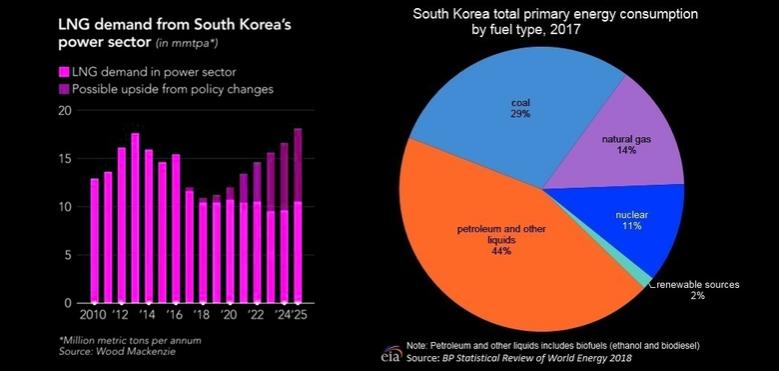
S.KOREA'S LNG WILL UP

PLATTS - The South Korean government Tuesday gave its final approval to lower taxes on LNG used for power production by 75%, and raise those on thermal coal by 28% from April 1, in a move likely to boost downstream gas consumption.
The decision is likely to boost LNG demand from the world's third-largest LNG importer. South Korea imported 42.7 million mt of LNG in 2018, up 15% from a year earlier, according to S&P Global Platts Analytics.
The decision is driven by the government's efforts to reduce the country's heavy reliance on coal and increase the use of natural gas and renewables amid growing air pollution concerns.
South Korea's energy tax regime has traditionally triggered criticism that it does not do enough to cut coal demand and increase competitiveness of LNG prices.
"Currently, total taxes on LNG are Won 91.4/kg, much higher than taxes on coal at Won 36/kg, said an official with the Ministry of Trade, Industry and Energy. "But through the tax rate changes from next month, total taxes on LNG will be lowered to Won 23/kg, compared with Won 46/kg on coal."
The tax benefit, however, is applicable to LNG used in electricity generation, not city gas households and businesses, the official said.
RISING LNG COMPETITIVENESS
Taxes on LNG for power production, which comprise consumption tax, import surcharge and import tariff, will be lowered to Won 23/kg ($0.02/kg) from Won 91.4/kg currently.
Consumption tax will be reduced to Won 12/kg from Won 60/kg, import surcharge will be lowered to Won 3.8/kg from Won 24.2/kg, and imports tariffs will remain unchanged at Won 7.2/kg.
Import surcharge and tariffs are used to fund the country's energy projects, according to the ministry official.
Consumption tax on thermal coal will increase to Won 46/kg from Won 36/kg currently, after rising from Won 30/kg in April 2018. There are no import surcharge or import tariffs on coal.
"The tax measure would reduce the country's fine dust production by 427 mt/year," the official said.
FURTHER COAL PRODUCTION CUTS
In an additional measure to reduce coal consumption, the country has closed four coal-fired power plants aged over 30 years from March through June 2018.
The government is also pushing to reduce operations at the other coal-fired power plants during the off-peak spring seasons, the official said.
President Moon Jae-in is pushing to reduce the portion of coal in the country's actual power production to 36.1% in 2030 from 43.1% in 2017, while boosting LNG to 18.8% in 2030 from 16.9% in 2017.
He also aims to increase the share of renewables to 20% in 2030 from 6.7% in 2017, while reduce the share of nuclear to 23.9% in 2030 from 30.3% in 2017.
President Moon, who took office in May 2017, has pledged to shut down 10 aged coal-fired power plants before his five-year term ends in May 2022.
Among them, four coal-fired power plants have been already closed, and two more will be permanently shut down by December this year or early next year. The government has also pushed for converting some coal-fired power plants under construction into LNG-based ones, which would help boost the country's LNG demand.
-----
Earlier:

2019, March, 15, 10:30:00
LNG U.S. ACCELERATIONExports of liquefied natural gas (LNG) from the U.S. continue to rise, as the use of natural gas for power generation increases in countries such as China, South Korea, Japan, and Mexico. |

2019, March, 1, 11:35:00
S.KOREA, UAE NUCLEAR COOPERATIONThe leaders of South Korea and the United Arab Emirates have said the two countries will seek opportunities to cooperate in the field of nuclear energy beyond their current collaboration on the Barakah nuclear power plant project. This will include opportunities in third countries. |

2018, October, 12, 11:15:00
THE FIRST LNG CANADAEIA - The project is a joint venture between Royal Dutch Shell (which holds a 40% stake in the project), Petronas (25%), Mitsubishi (15%), PetroChina (15%), and Korea Gas (5%). |

2018, June, 20, 12:10:00
GAZPROM'S GAS FOR KOREAPLATTS - "Today, the political situation is somewhat different. The South Korean side approached Gazprom about the revival of this project. A series of talks took place on this. These talks are continuing. We can't say anything further, but we are renewing such talks with the Korean side," Markelov said. |

2018, April, 25, 09:55:00
ASIA'S LNG DEMANDREUTERS - global liquefied natural gas (LNG) imports have risen 40 percent since 2015, to almost 40 billion cubic meters (bcm) a month. Growth accelerated in 2017, with imports up by a fifth, largely because of rising demand in China, but also in South Korea and Japan. |

2018, April, 9, 11:15:00
UAE - S.KOREA COOPERATIONWNN - The Emirates Nuclear Energy Corporation (Enec) and its joint venture subsidiaries, Nawah Energy Company (Nawah) and Barakah One Company (BOC), have signed three agreements with Korean companies. Enec and Korea Electric Power Corporation (Kepco) in October 2016 signed a joint venture agreement that made Kepco a minority shareholder in Nawah and BOC. |

2018, January, 19, 12:15:00
S.KOREA'S DIVERSIFICATIONPLATTS - For full-year 2017, South Korea's crude imports from its biggest supplier Saudi Arabia fell 1.7% to 319.02 million barrels, compared with 324.45 million barrels in the previous year, customs data showed. On the contrary, South Korea has imported 1.77 million mt, or around 13 million barrels, of crude from the US in 2017, about four times higher than in 2016. Shipments from Russia grew to 140,000 b/d last year from 112,000 b/d in 2016. |





